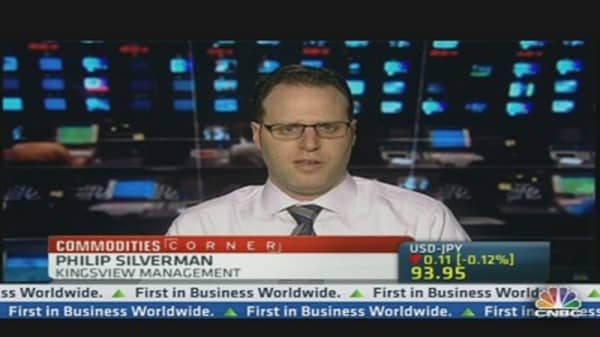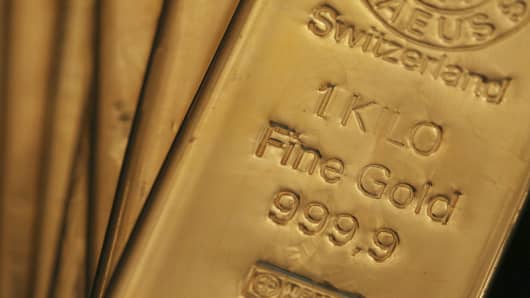The World Gold Council said last month that central banks accumulated more gold last year than they have annually in nearly half a century as they diversified their reserves.
South Korea's central bank said on Wednesday that it spent $1.03 billion last month to add 20 metric tons of gold to its holdings. It was the Bank of Korea's fifth purchase of gold in less than two years.
(Read More: Central Banks Bought Most Gold in Nearly 50 Years)
Going Down
Gold prices are down 12 percent from a peak in October to about $1,583 an ounce. The fall has coincided with a surge in global stock markets amid growing confidence that the world economy has turned a corner and will remain underpinned by the ultra-easy monetary policy of major central banks.
(Read More: Finally! Economic Recovery Is Starting to Pick Up Steam)
The move lower in gold prices has encouraged investors to bail out of gold exchange-traded funds (ETFs), which accumulate physical gold and then issue shares. And analysts say gold-based ETFs are set to record their weakest month on record as the recent fall in gold prices unnerves investors.
Silverman said that the selloff in gold ETFs was a response to the tumble in the spot gold price.
"As far as ETFs go, a lot of hedge funds have been burnt by holding gold in an environment where equities are going through the roof. At the same time a lot of commodity trading advisors were getting out of gold and then going short," he said. "The selling is much more of a reaction to what's going on with gold right now. If you take a long-term horizon, it's a good time to add gold."
Jonathan Barratt, founder of the commodities newsletter Barratt's Bulletin in Sydney said it was unlikely that buying by central banks could offset a short-term move lower in gold.
"I genuinely think that the central bank buying is well disguised and if the market really wants to see a further shake out it can. I don't think the central bank buying will actually hold it up," he said, adding that the trend for gold was neutral to bearish.
(Read More: Paulson's Gold Fund Limps Forward)
"There's been a lot of things that have changed in the past month, in terms of how everyone's perceiving where we're going to be in six months. And on that equation buying gold doesn't fit in," he added.
Paul Krake, founder of consultancy View from the Peak: Macro Strategies, told CNBC earlier this week that the shift in sentiment towards gold could see the precious metal fall to $1,300 "easily" by the end of the year, a fall of almost 18 percent from current levels.
"If you have all this money slushing around in the system, then you want to be in riskier assets, you want to be in assets that have a yield and gold doesn't have a yield," he said.
But according to Silverman the devaluation of currencies via money printing will lead people to move money into gold as it is "ultimately a store of value."





